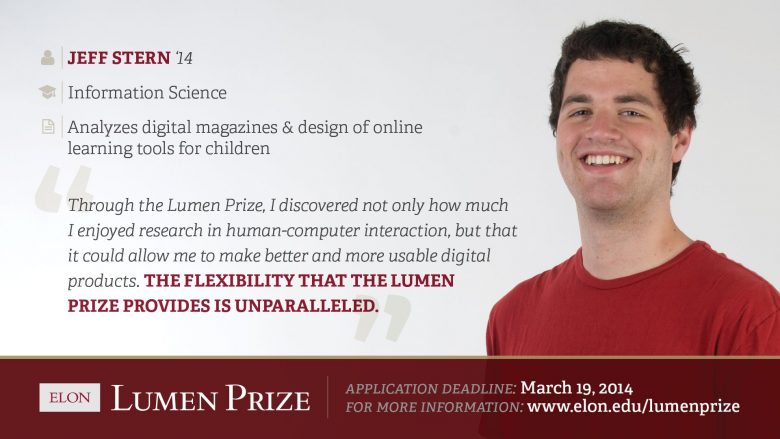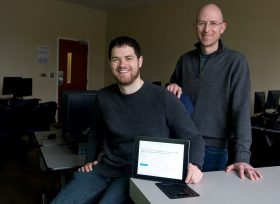As a growing number of grade schools complement traditional textbooks with computer tablets, senior Jeff Stern is using a top Elon University award to research the way children retain information from the two types of media.
 By Sarah Mulnick ‘17
By Sarah Mulnick ‘17
School systems from Ohio to North Carolina to Virginia announced plans in recent months to equip at least some of their students with computer tablets intended to enrich classroom learning.
But with seven-figure price tags for their efforts, educators don’t often possess a significant amount of research to cite when making those technology purchases, and an Elon University senior wants to fill that void.
Jeff Stern, an information science major from Long Island, has spent much of the past two years analyzing the way children learn from tablets, and his work is the latest to be featured on E-net this year in a series of profiles on Lumen Scholars in the Class of 2014.
Under the mentorship of Duke Hutchings, an associate professor of computing sciences, Stern’s study involves fourth and fifth graders given a tablet-version and print copy of the same magazine. He then measures information retention, engagement and preferences.
“This is about understanding a small portion of educational technology,” Stern said. “Moving forward I want to help develop new technologies that improve that space.”
Stern’s data collection found no significant difference in terms of engagement or information retention using either tablets or print magazines, and Stern believes tablets are a viable alternative to paper.

Stern’s research has been framed in a research paper and submitted to the CHI 2014 conference, the biggest international conferences for human-computer interaction research. His paper will be presented in the Student Research Competition aspect of CHI.
“He has really matured as a researcher,” Hutchings said of his Lumen Prize mentee. “He takes the most of every opportunity and takes everything to the next level. Ultimately, Jeff is really dedicated to understanding the education of kids, which is really admirable.”
The Lumen Prize, awarded for the first time in 2008, provides selected students with a $15,000 scholarship to support and celebrate their academic and creative achievements. Lumen Scholars work closely with faculty mentors to pursue and complete their projects.
Efforts include course work, study abroad, research both on campus and abroad during the regular academic year and summers, internships locally and abroad, program development and creative productions and performances.
Although Stern never expected to do independent research in college, he said it has been an enlightening and enjoyable experience. Stern admitted that prior to winning the Lumen Prize, he had several misconceptions about research, including worries that it would lock him up in “a small office in a university somewhere while I did my own thing.”
Despite his fears, he said, the Lumen prize helped to open his eyes to the possibilities of applied research.
“In academia you can tackle questions that have not been answered before,” Stern said. “They tend to be problems that have not been solved yet.”
Stern’s other Elon experiences have included working as The Pendulum student newspaper’s online managing editor and attending most basketball games. He interned last summer at Google, which he said was possible due to the experience that the Lumen Prize gave him, and he introduced Apple co-founder Steve Wozniak last fall at a campus question-and-answer forum.
He also coordinated January’s “Hour of Code,” an event hosted by the “Teaching Children (And Yourself) to Code” Burst the Bubble class he organized to introduce children in surrounding communities to concepts involved with computer programming.
Stern said he plans to pursue a doctoral degree and focus his research on the application of human-computer interaction to education. “The education space is large,” he said. “There are a lot of areas where I can make an impact.”


